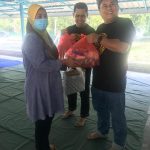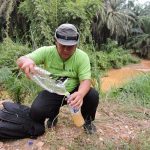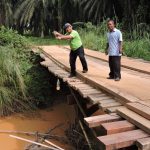
“I have to be the Permaisuri’s guide tomorrow,” said the man wearing an explorer’s khaki attire, perfect camouflage for someone who wants to observe the wild. “She wants to see the mangroves.”
The man is Dr. Maketab, now a retired lecturer, who is extremely passionate about the environment. Born in Kelantan, raised in Kedah, and now in Johor, he shares that Johor’s unique ecology is unlike any other. Mountains, mangroves, and marine – we have it all. He works with the Johor National Parks as a coordinator for any park-related matters such as research, expeditions, volunteers, funding, meetings and seminars. One of the tasks during expeditions includes an inventory check of the count and location of plants and animals, which the team uses to conduct research and present their findings at meetings and seminars.
At a certain elevation on Gunung Ledang lies the Slipper Orchids, where finicky plants grow at the right conditions and bloom only at a certain time. According to Dr. Maketab, there are only about 100 of such plants. His team also takes up the task of swiftly transferring the plants into a deeper part of the jungle to avoid being dug up by collectors who are not concerned about the preservation of wild plant species.
Dr. Maketab also shared how Johor is home to a plant called Paku Berlagu – scientifically name Cycas Centafolia, a new species of cycad under the category of “super endemic”, which means the plant is only found in a particular area. The Johorean soil also hosts super endemics such as betta persephone and betta coccina – extremely shy fishes only found in a river that remains undisclosed for the protection of the species. Due to their habitat and breeding preference, these fishes are difficult to breed in captivity. Part of Dr. Maketab’s involvement is to push for the protection of these species from going extinct.
As a holder of a Ph.D. in Water Quality and Water Quality Modeling, Dr. Maketab describes himself as a “water man”. He is always fighting to safeguard rivers and watersheds from pollution and to control bacteria levels. Even though Johor has a water treatment facility, if the colony-forming unit for bacteria is low, costs of treatment could be lowered and that money saved could be put to better use. However, to do so, we need to focus on environmental awareness and larger-scale protections, not merely profits.
“Water is a finite resource. Our source of water must be protected,” Dr. Maketab shared, speaking like a true “water man” that he is.




